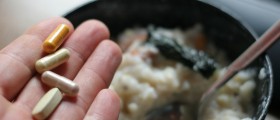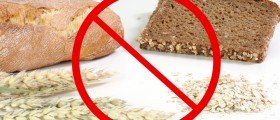Lactose Intolerance
Milk allergy or milk sensitivity is also known as lactose intolerance. People suffering from this condition experience variety of symptoms, such as abdominal pain, colic, diarrhea or constipation, heartburn, or skin reactions. Many patients also complain about ear infections, recurrent cold, asthma, headaches, and irritability.
Lactose intolerance patients can’t metabolize sugar found in milk and dairy products called lactose, because of the lack of enzyme lactase. The condition is widely spread, and some studies show that almost 75% of adult people all around the world suffer from some form of milk intolerance.

Dairy Products and Milk Intolerance
Patients suffering from lactose intolerance sometimes can use milk products. Symptoms of the milk allergy might be minimized if you use just small portions of milk. Some specialists recommend a maximum of 118ml (4 ounces) of milk to be used every day, especially with meals. Different kinds of dairy products contain more or less lactose. Yogurt, kefir, and other probiotics might be good for you because the bacteria in those drinks break the lactose. Also, you might look for dairy products labeled to contain smaller amounts of lactose or are completely lactose-free.
There are also OTC (over-the-counter) lactase tablets made to help you digest milk and dairy products. Some of the patients with milk intolerance may find them suitable.
Be careful and always check the list of the ingredients on the back of all products you use. Some prepared foods usually contain lactose, as well as some medication. If you are lactose intolerant, inform your doctor and pharmacist about it.
Patients suffering from lactose intolerance may need to increase the intake of other food rich in calcium, such as milk substitutes, tofu, almonds, leafy vegetables, canned salmon, oranges, and pinto beans.
Homeopathic Remedies
Many lactose intolerance cases were cured using homeopathy. Homeopathic practitioners may use more than 75 different medicines to help the patient suffering from this condition.
Abdominal gases and tiredness caused by lactose intolerance are sometimes treated with calcarea fluorica.
Aethusa is used in cases of congenital lack of lactase. Children usually suffer from weight loss, colic, and milk vomit.
Aethusa cynapium may be used to treat the constipation caused by milk. Often, in these patients, indigestion is accompanied by focus problems and poor circulation.
Apis is used to treat anaphylactic reaction to milk. This is a serious shock caused by lactose allergy, and patients might experience breathing problems, urticaria, swelling, redness and itching.
Carbo vegetabilis can be helpful in cases of abdominal pain and distended abdomen.
Magnesia muriaticum is suitable for patients with frequent headaches and chronic symptoms of milk intolerance. These people have suffered from abandonment in the past and often feel sad and isolated. Also, they tend to compromise whenever they can which make them known as peacemakers.
Patients that respond to milk with diarrhea and abdominal bloating and pain could be treated with sulphur. Usually, these people are selfish and egocentric and could be too lazy to work.
- Sulphur: It is an important component in glucose digestion. It mainly helps in the absorption of glucose molecules in the small intestine. It is a very use full medicine for milk intolerance.
- Magnesia Muriatica – is a well indicated homeopathic medicine for milk allergy with stomach pain. The person needing this remedy complains of a stomach ache from milk intake. The abdomen is tensed and sensitive to touch. Other symptoms that may appear include flatulence and vomiting.
- Pulsatilla – it’s a homeopathic cure for milk allergy when consumption of milk products triggers a reaction. Any milk-based products like creams, pastries, ice cream, butter, etc, tend to bring on the reaction. The symptoms appearing from these products include abdominal colic, flatulence, and a distended abdomen. Diarrhea with cutting pain in the abdomen may be present. Other attending symptoms include the sensation of weight in the stomach, along with nausea and vomiting.
- China Officinalis: These patients are unable to digest milk or other dairy products, which when taken will produce symptoms of bloating, belching, and flatulence. They also suffer from abdominal colic due to gas that becomes relieved only by bending double or by vomiting of food.
- Natrum Carb – it is an effective homeopathic medicine for milk allergies when the person gets diarrhea after consuming milk. Natrum Carb is used in cases where yellow, watery, and gushing stool occur after consuming milk. The stool smells sour, and blood may appear. There is a marked urgency to pass stools along with fetid flatus. There may also be severe abdominal colic present in some cases.
- Lac caninum: its an effective homeopathic medicine for decided effect in drying up milk in women who cannot nurse the baby. It mainly works on the cause for milk intolerance for an infant which works in the mother’s body.
- Calcarea Carb – it is an important homeopathic medicine for milk allergy when there is vomiting after consuming milk. There is nausea, cold sweat, and trembling along with a distended abdomen and cutting pain. In some cases, there may be a cold sensation in the abdomen.
- Silica– it is an effective homeopathic medicine mainly in infants with breast milk intolerance. A patient needing silicea might lack vital heat and has cold hands and feet. The indications include diarrhea in response to milk along with abdominal pain and bloating in the morning.
- medlineplus.gov/druginfo/natural/721.html
- Photo courtesy of an_vision by Unsplash: unsplash.com/photos/5SN5N5-JM3c

















Your thoughts on this
Loading...